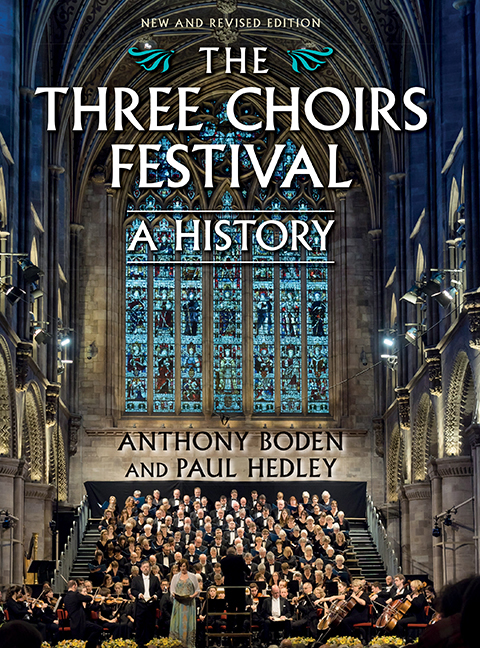Book contents
- Frontmatter
- Contents
- List of Illustrations
- Preface
- Acknowledgements
- List of Abbreviations
- List of Cathedral Organists
- 1 Origins
- 2 A Fortuitous and Friendly Proposal
- 3 A Numerous Appearance of Gentry
- 4 ‘The Musick of my Admiration Handel’
- 5 The Gentlemen and the Players
- 6 Avoiding Shipwreck
- 7 Prima voce
- 8 Favourites and Flops
- 9 Sacred and Profane
- 10 Froissart
- 11 The Unreasonable Man
- 12 The Dream
- 13 Beyond these Voices
- 14 An Essentially English Institution
- 15 The Elgar Festivals
- 16 Dona nobis pacem
- 17 Recovery
- 18 Association
- 19 A New Epoch
- 20 Jubilee
- 21 Theme with Variations
- 22 Houses of the Mind
- 23 ‘A Gold-Plated Orchestra’
- 24 A New Millennium
- 25 Reorganisation
- 26 An Invitation to the Palace
- Appendix Three Choirs Festival Timeline
- Select Bibliography
- Index
- Plate section
17 - Recovery
Published online by Cambridge University Press: 11 August 2017
- Frontmatter
- Contents
- List of Illustrations
- Preface
- Acknowledgements
- List of Abbreviations
- List of Cathedral Organists
- 1 Origins
- 2 A Fortuitous and Friendly Proposal
- 3 A Numerous Appearance of Gentry
- 4 ‘The Musick of my Admiration Handel’
- 5 The Gentlemen and the Players
- 6 Avoiding Shipwreck
- 7 Prima voce
- 8 Favourites and Flops
- 9 Sacred and Profane
- 10 Froissart
- 11 The Unreasonable Man
- 12 The Dream
- 13 Beyond these Voices
- 14 An Essentially English Institution
- 15 The Elgar Festivals
- 16 Dona nobis pacem
- 17 Recovery
- 18 Association
- 19 A New Epoch
- 20 Jubilee
- 21 Theme with Variations
- 22 Houses of the Mind
- 23 ‘A Gold-Plated Orchestra’
- 24 A New Millennium
- 25 Reorganisation
- 26 An Invitation to the Palace
- Appendix Three Choirs Festival Timeline
- Select Bibliography
- Index
- Plate section
Summary
THE grim austerity of post-war Britain – shortages of food, petrol and paper, the continued requisitioning of city hotels, and greatly increased costs – could easily have deterred the Hereford Three Choirs Committee from embarking upon a resumption of the Festival in 1946. Percy Hull, the Hereford Cathedral Organist, was confident that all of the problems could be overcome, but there were pessimistic voices at a meeting of Stewards and supporters held on 27 October 1945. Once again the Festival was saved by the needs of the charity, whose fortunes at Hereford, according to Prebendary P. A. Lushington, were ‘absolutely on the rocks’.1 The Deans of Gloucester and Worcester made vigorous appeals for more faith, and further support came from Sir Ivor Atkins. But when the question was put to the meeting, several people refused to vote. The decision to hold a Festival in Hereford was carried by about twenty-five votes to six. A new secretary, Mr T. O. D. (Tom) Steel, was appointed and the dust blown from the programme planned for the abandoned Festival of 1939, which was used to form the basis of the revival. Detailed preparations went ahead and were well advanced when, just three months before the start of the Festival, came a major blow.
Percy Hull, who had been unwell since the beginning of 1946, now suffered a nervous breakdown. Hull's doctors were unable to predict how soon he would be well enough to resume his duties, and advised him that the organisers should be prepared for his complete absence from the Festival. At an emergency committee meeting held on 7 June 1946 it was resolved to ask Sir George Dyson to accept the position of deputy conductor for the Festival. The next day he travelled to Hereford and addressed the committee:
He stressed very strongly that it was the very essence of the tradition of the Festival that the Conductor should be the local Cathedral Organist and he felt that if, for any reason, the local organist was not able to conduct this should be undertaken by the other two. He gratefully acknowledged the compliment implied by the invitation but did not feel that it would be wise to break with tradition, particularly as this Festival was a revival after the war.
- Type
- Chapter
- Information
- The Three Choirs Festival: A HistoryNew and Revised Edition, pp. 227 - 242Publisher: Boydell & BrewerPrint publication year: 2017



